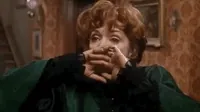Even the most meticulous proofreaders make mistakes from time to time.
Typos, spelling mistakes and grammatical errors are irritants to some, sources of mirth to others and can lead to ridicule for those responsible.
Nobody is perfect, yet some blunders are far more costly and humiliating than others.
The Reserve Bank of Australia (RBA), for example, recently printed 46 million new bank notes with a glaring spelling mistake.
The word "responsibility" was erroneously spelled "responsibilty" on a newly minted A$50 ($35; £27) featuring Edith Cowan, Australia's first female MP.
Australia's A$50 note misspells responsibility
Why spelling mistakes don't really matter
Trump's new word breaks internet
Not surprisingly, the gaffe has been widely mocked on social media, but it is far from the only example of spelling sloppiness.
Here are some other errors that have generated headlines.
Trump's baffling 'covfefe' tweet
On 31 May, 2017, US President Donald Trump raised eyebrows by including a curious seven-character word in a late-night tweet.
"Despite the constant negative press covfefe," he tweeted.
The word, "covfefe", was not included in any English dictionary. It appeared Mr Trump intended to write "coverage", maligning reports about his presidency.
In a bizarre twist, then-White House Press Secretary Sean Spicer said Mr Trump knew "exactly what he meant".
Internet users had a field day, teasing Mr Trump for his apparent typo.
Nasa's 'most expensive hyphen'
A misspelled word in a tweet is usually a trivial matter. A mistake by US space agency Nasa, however, is of a different order of magnitude.
On 22 July, 1962, Nasa launched Mariner 1, an American spacecraft designed for a planetary flyby of Venus.
Just five minutes after lift-off, Mariner 1 aborted its mission and was destroyed. Built at a cost of $18.5m (£14.2m), the launch was an expensive failure.





















 My unique id: 293-030-175-3
My unique id: 293-030-175-3









.thumb.jpg.82414d9ca112b321b49ea4372c76f764.jpg)